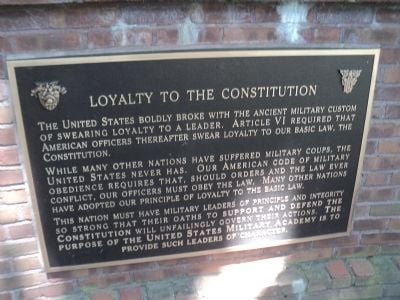Does Steve Bannon’s Role on the Principals Committee Require Senate Confirmation?
President Trump’s customary presidential memo setting the organization of the National Security Council has caused a fair amount of consternation in the national security community. The fact that the Director of National Intelligence and Chairman of the Joint Chiefs of Staff are no longer regular members of the Committee raised a few eyebrows.
President Trump’s customary presidential memo setting the organization of the National Security Council has caused a fair amount of consternation in the national security community. The fact that the Director of National Intelligence and Chairman of the Joint Chiefs of Staff are no longer regular members of the Committee raised a few eyebrows. But the revelation that Steve Bannon, Assistant to the President and Chief Strategist, is an invitee to all National Security Council meetings and has also been appointed to be a “regular attendee” of meetings of the Principals Committee has caused outright alarm.
Most of that alarm has centered on policy concerns about Bannon’s addition. On Lawfare, John Bellinger noted that Bannon’s presence represents a commingling of the “political side” of the White House with the national security side, which is an “unusual” deviation from past practice. Officials ranging from Senator John McCain to former Defense Secretary Robert Gates to former U.N. Ambassador and National Security Adviser Susan Rice, have raised concerns. (Theirs and others' reactions are available here.) And Just Security’s Kate Brannen has a detailed examination of the potential effects Bannon’s role will have on decision-making in the NSC.
But some criticism has also taken on a legal character. Yesterday, Newsweek’s Jonathan Alter tweeted:
Breaking: obscure law requires Sen confirmation for WH aide like Bannon to serve on NSC. 50 U.S. Code § 3021 https://t.co/1sRQEnP3CY
— Jonathan Alter (@jonathanalter) January 31, 2017
Alter’s citation of subsection (a)(6) has been picked up by others and used to buttress the call for Bannon’s removal. It is an appealing argument for critics, in part because most people assume that Bannon could not obtain Senate confirmation because of his controversial political views—in particular those on Islam, race, and immigration—as well as his checkered history of personal conduct. But for all the reasonable arguments against Bannon’s influence in the NSC—and there are many—this one is particularly weak.
In the interests of being disciplined on issues on national security law and dispelling a bit of a myth that seems to be picking up steam, below is a brief overview of why that statute does not, in fact, require Bannon be Senate confirmed.
It bears noting that the National Security Act of 1947 is not actually an “obscure law.” But even if it were, the legal argument is still more or less baseless. Nothing in the law actually requires Bannon be confirmed.
First, it’s important to understand what Bannon has been designated to do. Trump’s National Security Presidential Memorandum first designates Bannon as an “invitee” of the National Security Council; that is, he is “invited” to attend all meetings of the NSC. The NSPM then designates Bannon as a “regular attendee” to Principal Committee meetings. The distinction here is legally significant, because the role that Bannon plays in either of the NSC or the Principals Committee is dispositive in determining whether Bannon is required to have Senate confirmation.
The statute referenced by Alter and others (50 U.S.C. § 3021) establishes the National Security Council as the body to “advise the president with respect to the integration of domestic, foreign, and military policies relating to national security” and sets out some prescriptions for who gets a seat. Only those listed under subsection (a)(1) through (a)(6) can be on the NSC, and there is a plausible argument that can be made that all these require Senate confirmation.
According to the Conference Report on the National Security Act Amendments of 1949, a Senate amendment “authorized the President to add any other officials in the executive branch [to the NSC] when confirmed therefor by the Senate.” While this provision was eventually dropped from the bill, legislators left in subsection (a)(6), which permits “the Secretaries and Under Secretaries of other executive departments and of the military departments, when appointed by the President by and with the advice and consent of the Senate,” to serve on the NSC. This demonstrates that Congress was concerned about and consciously chose to make confirmation part of the process of NSC membership.
So Bannon could probably not be on the NSC unless he were to receive Senate confirmation.
But Bannon isn’t on the NSC; as mentioned above, he is merely an “invitee.” Considering the control Bannon apparently wields, that may seem like a distinction without a difference, but the President is allowed to “invite” anyone he wants to attend NSC meetings—there is no requirement that these “invitees” be confirmed.
Bannon’s other role is more formal. He is a “regular attendee” of the Principals Committee. The Principals Committee is the “Cabinet-level interagency forum for considering policy issues that affect national security.” But nothing in the National Security Act dictates who sits on the Principals Committee. In fact, the Act does not reference such a group at all. The Principals Committee is merely a mechanism that presidents have used to organize how the NSC operates, but are permitted to change or disband at will. Indeed, every president since Bush 41 has customized the Principals Committee to meet their needs and preferences. The statute mandating Senate confirmation only applies to the members—though not invitees—of the National Security Council (the body chaired by the President), not to “regular attendees” of the Principals Committee (the body chaired by the National Security Advisor).
So while Bannon is on the Principals Committee, co-equal to members of the NSC who must be Senate confirmed, the White House has discovered a loophole in which Bannon can have a significant leadership role in NSC decisionmaking without requiring confirmation. And while Bannon’s role is certainly unprecedented, the attendance of political staff is not entirely without prior example. President Obama occasionally included David Axelrod and Robert Gibbs—though only on a very limited basis, contrary to Sean Spicer’s recent sweeping claims.
If § 3021 is read to require that Bannon receive Senate confirmation, that means the provision governs and limits the membership of the Principals Committee (given that it is the National Security Council minus the President and the Vice President). But that assertion is not backed up by the historical record. Ultimately, § 3021 governs only the NSC, not the Principals Committee. Perhaps this is because while “some of the most sensitive and sacrosanct decisions are made in meetings of the National Security Council,” the Principals Committee is merely the liaising body used by the president to organize advice, not to make decisions.
Even so, there is no question that Trump giving Bannon status as a regular attendee of the Principals Committee is unprecedented, “unusual,” and that many security experts believe it is potentially dangerous. Laurence Tribe put the situation as follows:
2/role Bannon has been given is crazy and dangerous but it doesn't seem to violate any law, though it probably should.
— Laurence Tribe (@tribelaw) January 31, 2017


.png?sfvrsn=48e6afb0_5)


